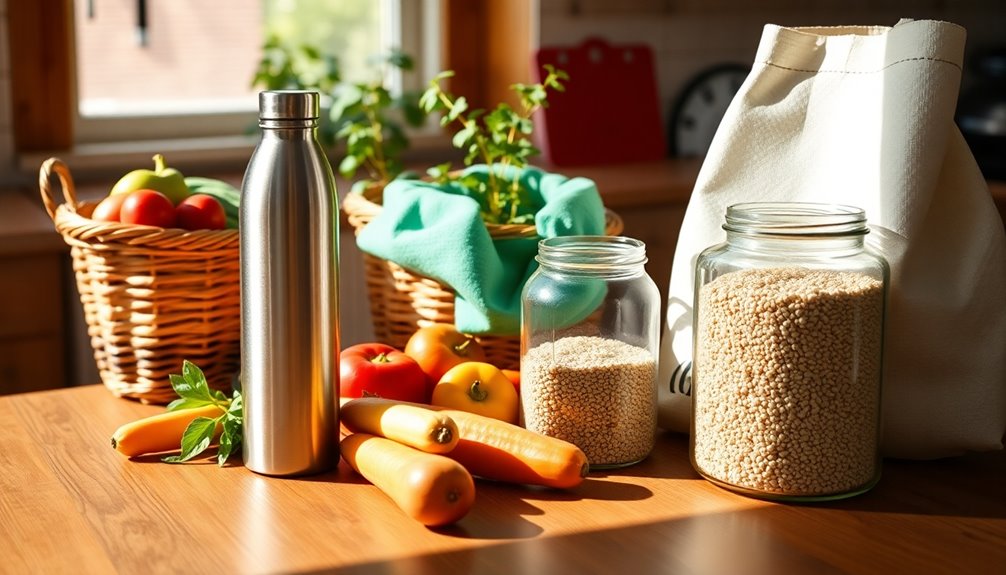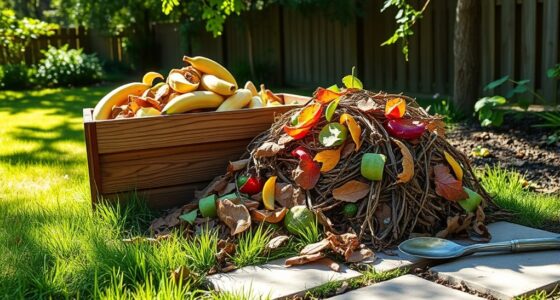Reducing plastic use in your daily life is easier than you think. Start by swapping plastic bags for reusable cloth ones and ditch single-use bottles for a refillable option. Use glass or stainless steel containers for food storage instead of plastic. Embrace bamboo straws and beeswax wraps to cut down on waste. Every small change adds up and helps the environment. Keep exploring these simple tips to make a bigger impact in your daily routine.
Key Takeaways
- Replace single-use plastic bags with durable reusable cloth bags for shopping to minimize plastic waste.
- Use stainless steel or glass water bottles to eliminate reliance on disposable plastic bottles.
- Choose beeswax wraps or reusable silicone covers for food storage instead of plastic wrap.
- Opt for glass containers for food storage to avoid plastic contamination in your meals.
- Participate in local clean-up events to engage your community and raise awareness about reducing plastic use.
Understanding the Impact of Plastic Waste
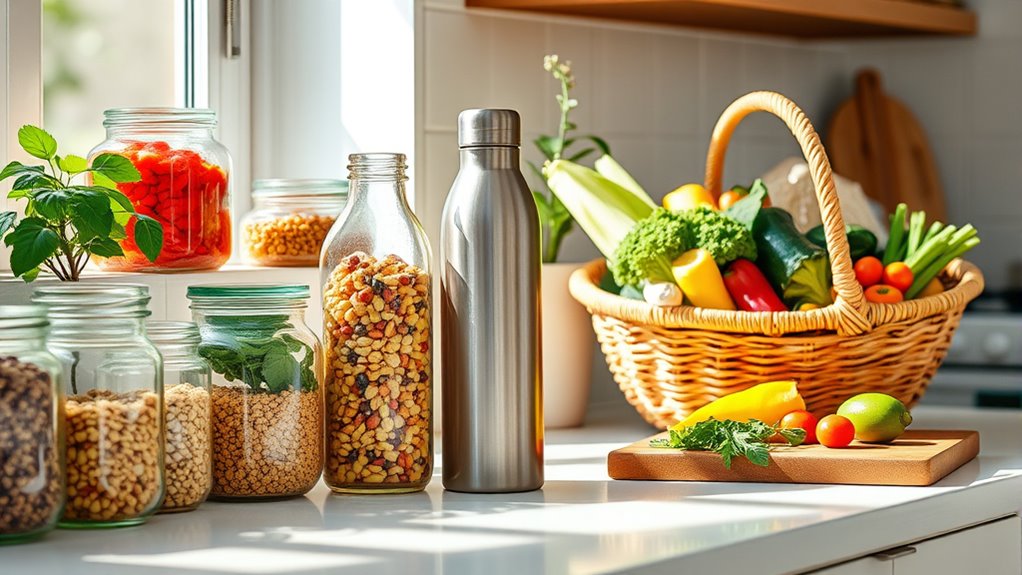
Plastic waste poses a significant threat to our environment and health. You mightn't realize it, but every piece of plastic you use can take hundreds of years to decompose.
As plastic breaks down, it releases harmful chemicals into the soil and water, contaminating ecosystems and endangering wildlife. You may also find that microplastics infiltrate your food and drinking water, posing risks to your health.
The production of plastic contributes to greenhouse gas emissions, further driving climate change. By understanding these impacts, you can make informed choices about your plastic consumption.
Recognizing the consequences of plastic waste empowers you to take action and strive for a healthier planet for yourself and future generations.
Simple Swaps: Alternatives to Everyday Plastic Items
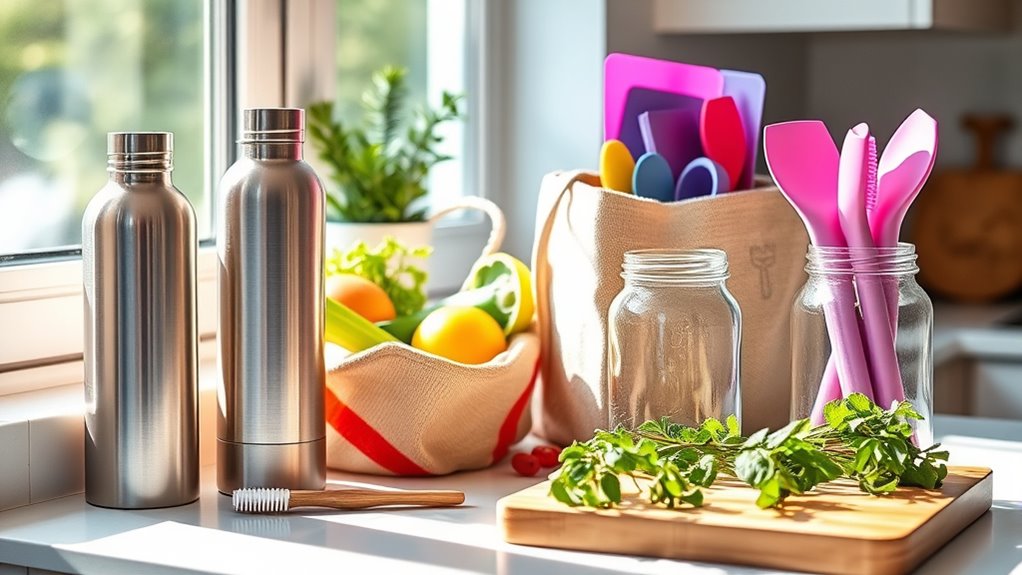
While it may seem daunting to reduce plastic use, making small, simple swaps can significantly impact the environment.
Start by replacing plastic bags with reusable cloth bags for shopping. Instead of plastic water bottles, opt for a stainless steel or glass alternative.
Replace plastic bags with reusable cloth bags and choose stainless steel or glass over plastic water bottles for a sustainable lifestyle.
Swap single-use straws for bamboo or metal ones. Use beeswax wraps instead of plastic wrap to keep food fresh.
For food storage, choose glass containers over plastic ones. When buying personal care products, look for those in paper or metal packaging instead of plastic.
Even switching from plastic utensils to bamboo or wooden options can make a difference.
These small changes can collectively reduce plastic waste and encourage a more sustainable lifestyle.
Embracing Reusable Products

Making sustainable choices goes beyond simple swaps; it's about fully embracing reusable products in your daily life.
Start by investing in a sturdy water bottle, reusable shopping bags, and cloth produce bags. These items not only cut down on single-use plastics but also save you money in the long run.
When you choose to use reusable containers for meals, you're not just reducing waste; you're also supporting a healthier lifestyle. Remember to keep a set of reusable utensils in your bag for those on-the-go meals.
Tips for Reducing Plastic in Your Home
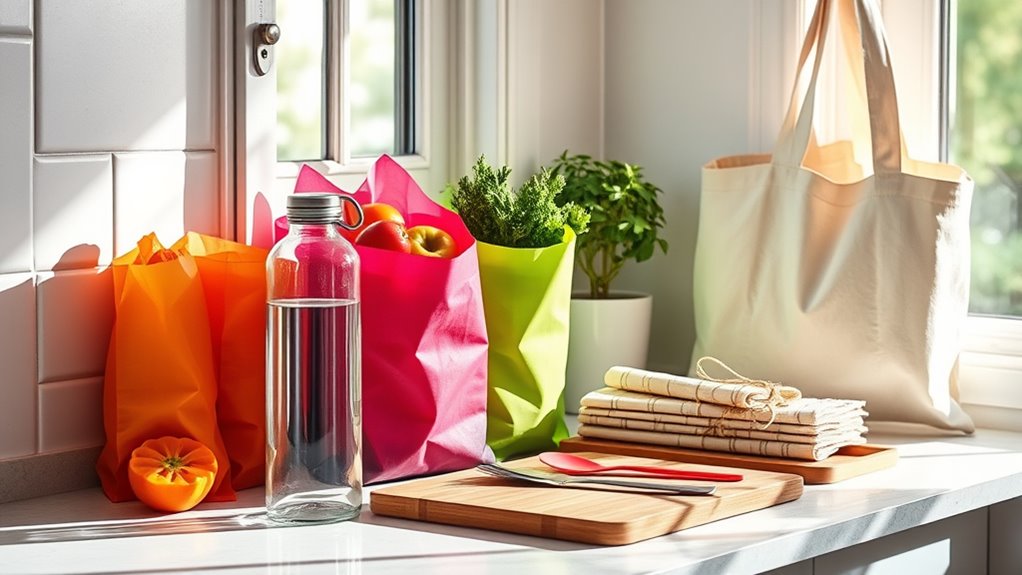
As you look around your home, you might be surprised by how much plastic surrounds you.
Start by swapping out plastic storage containers for glass or stainless steel options. Instead of plastic wrap, use beeswax wraps or reusable silicone covers to keep your food fresh. Opt for a refillable water bottle and ditch single-use plastic bottles altogether.
When shopping, bring your own reusable bags and choose products with minimal or no plastic packaging. In the bathroom, consider bar soap and shampoo bars instead of liquid products in plastic bottles.
Finally, be mindful of plastic items you may not think of, like straws and cutlery—invest in reusable alternatives. Small changes can make a big difference in reducing plastic waste at home.
Engaging Your Community in Plastic Reduction Efforts

Engaging your community in plastic reduction efforts can amplify the impact of your personal changes. Start by organizing local clean-up events or workshops focused on sustainable practices.
Invite your neighbors, friends, and local businesses to join in. Sharing knowledge about alternatives to single-use plastics can inspire others to take action. You can also create social media campaigns to raise awareness and encourage participation.
Partner with local schools to educate students about the importance of reducing plastic waste. Form a community group dedicated to advocating for policies that support sustainability.
Frequently Asked Questions
How Can I Educate My Children About Plastic Waste?
You can educate your children about plastic waste by making it a fun and engaging topic.
Start with simple explanations about where plastic comes from and its impact on the environment. Use visuals, like videos or pictures, to illustrate the problem.
Encourage them to participate in activities like recycling or crafting projects using recycled materials.
Take trips to local clean-up events, showing them how they can contribute to a cleaner planet while learning valuable lessons.
What Are the Health Risks of Using Plastic Products?
Using plastic products can pose several health risks.
Chemicals like BPA and phthalates can leach into food and drinks, disrupting your hormones and potentially leading to reproductive issues.
You might also be exposed to microplastics, which can enter your body through ingestion or inhalation, causing inflammation and other health problems.
It's essential to be aware of these risks and consider alternatives to safeguard your health and well-being.
Are There Financial Benefits to Reducing Plastic Use?
Yes, there are financial benefits to reducing your plastic use. By opting for reusable items instead of single-use plastics, you save money over time.
Think about how much you spend on bottled water or disposable containers—switching to a reusable bottle can significantly cut those costs.
Additionally, many eco-friendly products are often more durable, meaning you won't have to replace them as frequently, leading to further savings in the long run.
How Can I Find Local Recycling Facilities?
Imagine strolling through your neighborhood, spotting a green bin that sparks your curiosity.
To find local recycling facilities, start by searching online for recycling directories or your city's waste management website. You can also use apps that pinpoint nearby centers.
Don't forget to ask neighbors or local community groups; they often have invaluable tips.
With a little effort, you'll discover convenient places to responsibly dispose of your recyclables.
What Policies Support Plastic Reduction in My Area?
To find out what policies support plastic reduction in your area, start by checking your local government's website.
They often post information about regulations, incentives, and community initiatives aimed at reducing plastic waste.
You can also attend town hall meetings or contact local environmental organizations for insights.
Engaging with neighbors and social media groups can help you discover grassroots efforts that align with your interests in supporting sustainable practices.
Conclusion
So, while you might think using a plastic water bottle is harmless, it's actually a drop in the ocean of waste we create. By making small changes—like swapping that bottle for a reusable one—you're not just saving the planet; you're saving yourself from becoming part of the problem. Isn't it ironic? The simplest choices can have the biggest impact. Let's not just talk about reducing plastic; let's actually do it, one small step at a time!
